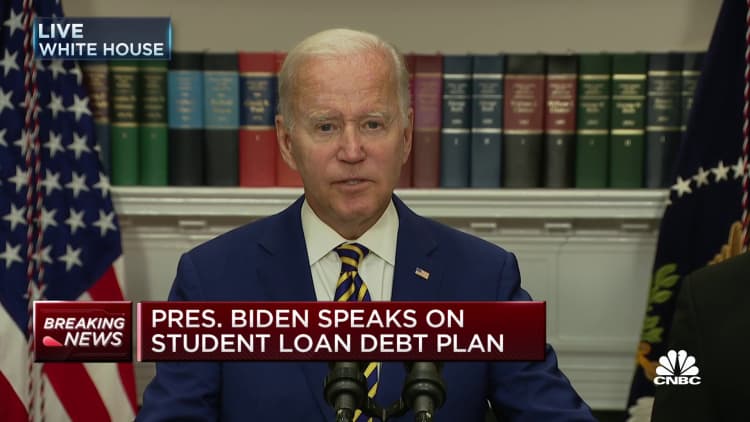
Porquenostudios | Istock | Getty Images
For those with student debt, the last few months may have given you whiplash.
First, President Joe Biden said in August that he’d be forgiving up to $20,000 for millions of borrowers. But before much celebrating could happen, Republicans brought a slew of challenges to the policy, leaving it in jeopardy even as the application for the relief went live. Since mid-October, 22 million Americans have applied for forgiveness.
Yet the biggest setback for the Biden administration’s sweeping plan came on Friday, when a U.S. appeals court temporarily blocked it from moving forward.
Here’s what borrowers need to know about the development, and what it could mean for your student debt.
Why is student loan forgiveness on hold?
In September, attorneys general from Republican-led states — Arkansas, Iowa, Kansas, Missouri, Nebraska and South Carolina — sued the Biden administration in an effort to stop its plan to cancel hundreds of billions of dollars in student debt.
U.S. District Judge Henry Autrey in St. Louis ruled earlier this month that while the states had raised “important and significant challenges to the debt relief plan,” they ultimately lacked legal standing to pursue the case.
More from Personal Finance:
These colleges promise no student debt
This is the best time to apply for college financial aid
Colleges struggle with enrollment declines, underfunding
The GOP-led states didn’t give up after their lawsuit was thrown out. They filed an appeal, and asked the court to stay the president’s plan, which was supposed to start unfolding as early as this week, while their request is considered.
The 8th U.S. Circuit Court of Appeals granted the states’ emergency petition, leaving the Biden administration unable to start forgiving any student debt for now.
What is the states’ argument against forgiveness?
The GOP-led states are accusing the president of overstepping his authority.
They also say that the action would cause some private lenders to lose business because it would prompt millions of borrowers who have their federal loans held with these companies to consolidate their debt into the main federal student loan program.
The U.S. Department of Education had said borrowers who hold these FFEL, or Federal Family Education Loans, can take this step to qualify for its relief.
How likely is their challenge to be successful?
The main obstacle for those hoping to foil the president’s action has been finding a plaintiff who can prove they’ve been harmed by the policy, experts say.
“Such injury is needed to establish what courts call ‘standing,'” said Laurence Tribe, a Harvard law professor. “No individual or business or state is demonstrably injured the way private lenders would have been if, for instance, their loans to students had been canceled.”
Legal experts say the GOP-led states will struggle to prove they have that necessary standing.

The Education Department, in order to protect its broader loan forgiveness policy, has now said that FFEL borrowers need to have consolidated their loans by the end of September to have qualified. They can no longer do so to qualify.
This will make it harder for the GOP states to make their case that the president’s plan will cost the private lenders a considerable amount of business, said higher education expert Mark Kantrowitz.
“The state attorneys general lawsuit was the strongest of the lawsuits until the U.S. Department of Education pulled out the rug by eliminating their legal standing,” Kantrowitz said.
How much could this delay forgiveness?
All the 8th U.S. Circuit Court of Appeals did on Friday was freeze the president’s plan until it decides whether or not to keep the plan on hold for the duration of the states’ appeal, explained Stephen I. Vladeck, a professor at the University of Texas School of Law.
“That’s not a big decision unto itself,” Vladeck said.
The real question, he said, will be what happens later this week when the court rules “what the status quo should be while the states’ appeal runs its course.”
“I think it’s an uphill battle for the states given the district court’s conclusion that it lacks standing,” Vladeck said.
Can I still apply for forgiveness?
Absolutely. The U.S. Department of Education is urging student loan borrowers to carry on seeking its relief.
“Tonight’s temporary order does not prevent borrowers from applying for student debt relief at studentaid.gov,” White House press secretary Karine Jean-Pierre said in a statement on Friday. “It also does not prevent us from reviewing these applications and preparing them for transmission to loan servicers.”
